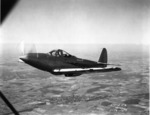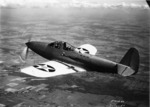XFL Airabonita
| Country | United States |
| Manufacturer | Bell Aircraft Corporation |
| Primary Role | Prototype Aircraft |
| Maiden Flight | 13 May 1940 |
Contributor: Alan Chanter
ww2dbaseWhen the US Navy issued a requirement in January 1938 for a lightweight high-performance shipboard fighter, the Bell Aircraft Corporation of Buffalo, New York, United States responded with its Model 5 XFL-1 Airabonita design which was derived conceptually from their land-based Model 11, XP-39 Airacobra, in parallel development. On 8 November the Navy ordered one prototype for trials and this aircraft (BuAer No.1588) would make its maiden flight on 13 May 1940.
ww2dbaseThe XFL-1 was powered by a 1,150-horsepower Allison XV-1710-6 twelve-cylinder Vee liquid-cooled engine with a single-speed supercharger installed aft of the pilot and driving a 10-foot 4.5-inch diameter Curtis three-blade propeller by means of an extension shaft. The experimental aircraft differed from its land-based counterpart principally in having a tailwheel undercarriage, underwing radiators, and larger flaps to reduce stalling speed for easier carrier landings. In addition the main undercarriage members were transferred to the front spar, an arrester hook fitted, the vertical tail surfaces redesigned and the airframe strengthened to allow for the extra rigours of carrier operation. The XFL-1 design was intended to have provision for an armament consisting of two 0.3-inch Browning machine-guns in the fuselage nose and a 0.5-inch Browning machine-gun, or a 37-millimeter T9 cannon, firing through the propeller hub. However no armament was ever installed in the prototype aircraft.
ww2dbaseInitial flight trials were hindered and delayed through problems with the engine and a measure of tail heaviness. The Bell design team proposed to cure the latter by adding ballast in the nose, but the US Navy refused to allow this. As a result the prototype was delivered to the US Navy somewhat later than had been planned which caused the official trials to be delayed until July 1940. An immediate problem at this stage was the aircraft's failure to secure carrier qualification due to undercarriage difficulties. The aircraft was returned to the manufacturer in December 1940 for modifications, but in February 1941, the US Navy decided that the XFL-1 was unsuitable for further development and that the rival Vought design (later designated F4U Corsair), clearly possessing greater potential, would be their preferred option. Far from being discarded completely, the XFL-1 prototype was eventually used for anti-aircraft tests during February 1942, during which the machine was destroyed - the wreckage surviving until the 1960s.
ww2dbaseSources:
Willian Green: War Planes of the Second World War - Fighters, Volume Four (Macdonald - London, 1961)
World Aircraft Information Files, File 890/12 (Aerospace Publishing Periodical)
William Green and Gordon Swanborough: The Complete Book of Fighters (Salamander, 1994)
Last Major Revision: Oct 2022
XFL Airabonita Timeline
| 11 Apr 1938 | Aircraft manufacturers Bell, Brewster, Curtiss, Grumman, and Vought-Sikorsky submitted proposals for the US Navy Jan 1938 requirement for a lightweight high-performance shipboard fighter. |
| 8 Nov 1938 | The US Navy ordered one prototype XFL-1 (Bell Model 8) aircraft from Bell Aircraft Corporation for trials. |
| 13 May 1940 | The Bell XFL Airabonita prototype aircraft took its maiden flight. |
| 27 Feb 1941 | The Bell XFL Airabonita prototype was returned to the US Navy at Naval Air Station Anacostia in Washington DC for further testing. |
SPECIFICATIONS
XFL-1
| Machinery | One Allison XV-1710-6 V12 engine rated at 1,150hp |
| Armament | 2x0.3in fuselage-mounted machine guns, 1x0.5in engine-mounted machine gun or 1x37mm engine-mounted cannon |
| Crew | 1 |
| Span | 10.67 m |
| Length | 9.09 m |
| Height | 3.90 m |
| Wing Area | 21.55 m² |
| Weight, Empty | 2,341 kg |
| Weight, Loaded | 3,271 kg |
| Speed, Maximum | 540 km/h |
| Speed, Cruising | 518 km/h |
| Rate of Climb | 13.36 m/s |
| Service Ceiling | 9,420 m |
| Range, Normal | 1,725 km |
Photographs
 |  |
Did you enjoy this article or find this article helpful? If so, please consider supporting us on Patreon. Even $1 per month will go a long way! Thank you. Share this article with your friends: Stay updated with WW2DB: |
- » WW2DB's 20th Anniversary (29 Dec 2024)
- » Wreck of USS Edsall Found (14 Nov 2024)
- » Autumn 2024 Fundraiser (7 Nov 2024)
- » Nobel Peace Prize for the Atomic Bomb Survivors Organization (11 Oct 2024)
- » See all news
 |  |
- » 1,150 biographies
- » 337 events
- » 44,024 timeline entries
- » 1,241 ships
- » 350 aircraft models
- » 207 vehicle models
- » 375 weapon models
- » 123 historical documents
- » 260 facilities
- » 470 book reviews
- » 28,585 photos
- » 432 maps
Thomas Dodd, late 1945